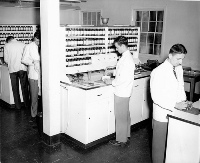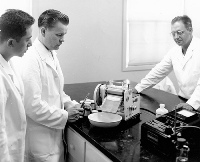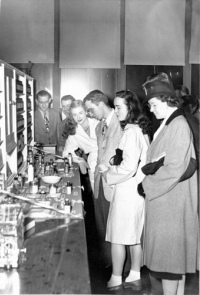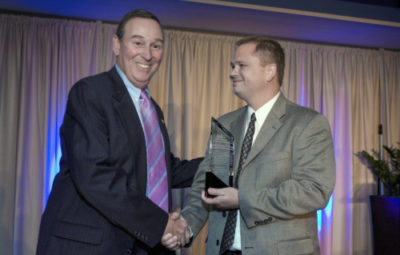An ongoing tradition of excellence in pharmaceutical education, research and service
Kansas City in the late 19th century was known as the “Crossroads of the Country.” A booming convergence of wagon trails, railroads and river traffic brought droves of settlers heading west, cowboys driving cattle to market and visionary industrialists looking for opportunity to the area. Kansas City was definitely happening, but not quite everything was “up to date.”
 Here and across the nation, it was still a time when apothecaries and traveling medicine shows were common sources of medicinal products for people seeking relief for what ailed them. “Frontier medicine” was still the general practice and every peddler had a snake oil, elixir, lotion or potion that would “cure” everything from consumption to lumbago to toothaches.
Here and across the nation, it was still a time when apothecaries and traveling medicine shows were common sources of medicinal products for people seeking relief for what ailed them. “Frontier medicine” was still the general practice and every peddler had a snake oil, elixir, lotion or potion that would “cure” everything from consumption to lumbago to toothaches.
But the late 19th century also saw the rise of scientific medicine in the United States. Scientists and physicians were pioneering new diagnostic and treatment regimens, and the production and testing of medicines was moving from the sideshow wagon to the laboratory.
Humble Beginnings
 In 1885, recognizing the need for more “modern” pharmacy education, a small group of area academic and civic leaders worked with the University of Kansas City to establish a Pharmaceutical Department at the school. The faculty consisted of four members of the Kansas City College of Medicine who were trained in both medicine and pharmaceutical sciences.
In 1885, recognizing the need for more “modern” pharmacy education, a small group of area academic and civic leaders worked with the University of Kansas City to establish a Pharmaceutical Department at the school. The faculty consisted of four members of the Kansas City College of Medicine who were trained in both medicine and pharmaceutical sciences.
When the university lost its charter, the pharmacy department was reorganized and reincorporated in 1889 as the “Kansas City College of Pharmacy,” and again in 1898 as the “Kansas City College of Pharmacy and Natural Science.” Although, faculty and student numbers continued to grow, the College’s leaders knew that long-term success depended on being able to merge with an established university.
 When the University of Kansas City (UKC) was successfully re-chartered in 1933, it provided a perfect partnership opportunity for the College of Pharmacy. The School was officially renamed the School of Pharmacy of the University of Kansas City in 1943 and joined the Schools of Dentistry and Law as UKC’s third professional school.
When the University of Kansas City (UKC) was successfully re-chartered in 1933, it provided a perfect partnership opportunity for the College of Pharmacy. The School was officially renamed the School of Pharmacy of the University of Kansas City in 1943 and joined the Schools of Dentistry and Law as UKC’s third professional school.
The School received full accreditation from the American Association of Colleges of Pharmacy (AACP) in 1948 and, when UKC merged with the University of Missouri System in 1963, the School of Pharmacy became, and remains, the only state-supported pharmacy school in Missouri.
Fast Forward
Now, 125 years from that humble beginning, the UMKC School of Pharmacy boasts a world-class faculty of more than 50, a student body of almost 700 and an enviable reputation for excellence in education, research and community service. From the School’s pioneering approach to distance education to its mission-based focus on community service, the UMKC School of Pharmacy continues to elevate that reputation to new levels.
“One of the things we tell our students is that patients aren’t going to care how much you know until they know how much you care,” said Robert W. Piepho, Ph.D., professor and dean emeritus of the School of Pharmacy. “It’s about the people we graduate who can go out there and serve patients and do it effectively.”
To expand the reach of its graduates and to address a critical and growing statewide shortage of pharmacists, the UMKC School of Pharmacy established a groundbreaking satellite program on the campus of the University of Missouri-Columbia in 2005, allowing students who cannot attend classes in Kansas City to earn their Doctor of Pharmacy degrees. In 2009, the School of Pharmacy signed an agreement to establish a second satellite program at Missouri State University in Springfield. As the programs continue to expand, the two satellite campuses are expected to matriculate up to 150 new pharmacy graduates per year.
Reflecting the School’s commitment to education, the UMKC School of Pharmacy also has made great strides in setting a “gold standard” for its commitment to the community. It is the only school in the nation to have received all three national AACP community service awards, including the Crystal Apple Award, the Student Community Engaged Service Award and the Transformative Community Service Award.
“Our school does so much in terms of volunteering and reaching out to the community,” said Kiengkham Vouthy, a third-year pharmacy student. “It’s a great family and a great community here.”
Behind the scenes, the School of Pharmacy’s faculty research focuses on serving the community’s pharmaceutical needs, advancing the standard of health care and improving the quality of life of the populations the School serves. The School was recently ranked 17th out of 116 pharmacy schools in National Institutes of Health research funding.
In the lab, in the classroom and in the community, the UMKC School of Pharmacy has been making a difference for 125 years and, under the leadership of its new dean, Russell B. Melchert, the School is prepared to carry that tradition into the next century and beyond.
“However you want to measure it we have a great program here with a tradition of excellence, community service and student learning,” Melchert said.

